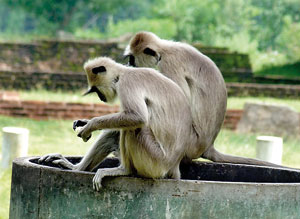A move by the Ministry of Coconut Development & State Plantations to issue air rifles to farmers to ward off monkeys and giant squirrels from damaging their crops, is drawing concerns of environmentalists.
An air rifle is a gun that fires pellets using the force of compressed air or other gases. Though a shot by an air rifle would not kill the animal, it is painful to the animal. However, fired at close range or hit in a sensitive area, it can prove fatal to the animal.
 |
| Grey langurs feed off a garbage bin |
The monkeys – particularly the Toque Macaque – is famous for raiding coconut plantations and other farms causing damage to crops. Monkeys have learnt to penetrate the coconut husk using their long canine teeth to reach the sweet water of the coconut. Being a playful animal, it literally hangs around under the canopy of the coconut tree damaging the tender leaves, flowers and young coconuts, depleting the harvest of this priced crop. Giant squirrels, like any other rodent, continuously use their incisor teeth, damaging the tender coconut. They also have the destructive habit of tearing down coconut leaves. Hence these animals are public enemies to the farmers.
The Ministry of Coconut Development & State Plantations is resorting to this decision in response to the pleas of planters and farmers who are constantly at the mercy of these animals.
Commenting on the decision to issue air rifles, Director General (DG)- Department of Wildlife, Chandrawansa Pathiraja said that he is not against the issuing of air rifles, as it would help farmers preserve their crops, while being optimistic that alternative methods such as poisoning or shooting with cartridges/bullets, usually used by farmers to kill these marauding animals, will reduce, as a compromise. At a time when the government is trying to promote agriculture, the DG is of the view that, it is an avenue for serious consideration.
However, environmentalists worry these air rifles will not merely ward off the animals, but reduce their numbers, and stress the need to address the root cause of habitat loss, which trigger all Human-Wildlife conflicts. Environmental Lawyer Jagath Gunawardene points out that, though the monkey is not protected by law, the giant squirrel is. Hence, regardless of the fact that these air rifles are issued by the government, any person found guilty of injuring/killing a giant Squirrel by shooting is liable to be prosecuted and punished according to the law. He also fears that air rifles will be used to hunt other animals such as flying squirrels too. The two species of flying squirrels found in Sri Lanka are threatened, and the Flora & Fauna Ordinance provides additional protection to them, with harming them, an offence that is non-bailable. Jagath Gunawardene urges to focus on the wider issue or the root cause of these conflicts and asks authorities to address the destruction and degradation of habitats, which is the root cause of all Human-Wildlife conflicts.
 |
Director- Smithsonian Primate Biology Programme, Dr. Woolfgang Dittius, who has done extensive research on the toque macaque, also points out that, the distribution of pellet guns to farmers, as a defence against monkeys and giant squirrels, is by itself, not an effective protection against monkeys. “Instead, it requires a more comprehensive approach involving garbage reduction, safeguarding all water and food sources and specially trained personnel to prevent pest problems”. He also points out the risk of distributing pellet guns, causing loss of eyes among children and animals, as well as festering wounds in animals. Dr. Dittius said his organisation is working with the Economic Development Ministry to come up with a long-term solution to the pest monkey problem.
Research Coordinator- Smithsonian Primate Biology Programme, Sunil Gunathilake, who is often in the field, stresses the need for people to be careful not to aggravate the conflict with monkeys by careless disposal of food items. The availability of water too has caused the population of these adaptable animals to increase - for example, during the drought, many baby monkeys die off, but the leaky taps and other water sources gives them the chance to survive. The monkeys, initially infiltrate the villages in search of food in the garbage, and then settle in the plantations and other farmlands, where their presence is destructive. He pointed out that Sri Lanka has urbanised too fast with no plans to manage the human-wildlife conflicts, as in the case of the monkey problem that requires their management. He recommended a sterilisation programme mainly targeting females to control the monkeys populating human habitats, where garbage is found. |



